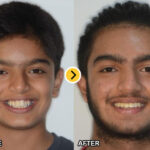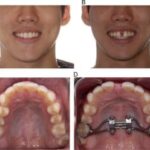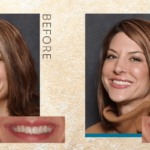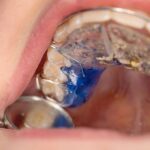Orthodontic expanders are commonly used in orthodontic treatment to correct issues with dental alignment and bite. These devices are designed to widen the upper jaw, creating more space for the teeth and improving overall oral health. While orthodontic expanders can be highly effective, they are not without their challenges. Patients may experience a range of common problems when using these devices, which can impact the success of treatment and require additional attention from the orthodontist.
Proper oral hygiene can also be a concern with orthodontic expanders. The device can make it more difficult to brush and floss effectively, leading to an increased risk of plaque buildup and tooth decay. Patients must be diligent in their oral hygiene routine, using special tools such as floss threaders or interdental brushes to clean around the expander. Regular dental check-ups and cleanings are also essential to monitor oral health and address any potential issues.
What are Orthodontic Expanders?
Orthodontic expanders consist of a metal framework with a screw in the middle. The device is custom-made to fit the patient’s mouth and is typically attached to the upper molars using bands or cemented to the teeth. The screw in the middle can be adjusted by the orthodontist to gradually widen the jaw over a period of time.
The goal of using orthodontic expanders is to create more space in the upper jaw, allowing for proper alignment of the teeth and improving the overall bite. By widening the jaw, orthodontic expanders can also help create a more aesthetically pleasing smile.
Overall, orthodontic expanders are a valuable tool in orthodontic treatment, helping to correct dental issues and improve oral health and aesthetics. If you think you or your child may benefit from an orthodontic expander, it is best to consult with an orthodontist who can evaluate your specific needs and recommend the most appropriate treatment plan.
Common Problems with Orthodontic Expanders
Orthodontic expanders are devices used in orthodontic treatment to widen the upper jaw and create more space for crowded or misaligned teeth. While these expanders can be highly effective in correcting dental issues, they can also come with their fair share of problems. Here are some common problems that patients may experience with orthodontic expanders:
- Pain and Discomfort: One of the most common problems with orthodontic expanders is the initial discomfort and pain that patients may experience. This is because the expanders are designed to apply pressure to the upper jaw, which can cause soreness and discomfort.
- Difficulty Speaking: Another problem that patients may encounter is difficulty speaking. The presence of the expander in the mouth can make it challenging to pronounce certain sounds and words, especially during the initial adjustment period.
- Excessive Saliva: It is not uncommon for patients to experience an increase in saliva production while wearing orthodontic expanders. This can be bothersome and may require frequent swallowing or spitting.
- Food Restrictions: Patients with orthodontic expanders may need to avoid certain foods that can get stuck in the expander or cause damage to it. Sticky and hard foods should be avoided to prevent any complications.
- Loose or Broken Expander: Occasionally, the expander may become loose or break due to various reasons. This can disrupt the treatment process and may require immediate attention from an orthodontist.
- Allergic Reactions: In rare cases, patients may develop allergic reactions to the materials used in the orthodontic expander. This can manifest as swelling, itching, or rashes in the mouth.
- Pressure on Teeth: The pressure exerted by the expander on the teeth can cause discomfort and may even lead to toothache in some cases. Regular monitoring by an orthodontist is essential to ensure that the pressure is distributed evenly.
- Headaches: It is not uncommon for patients to experience headaches, especially during the initial stages of wearing orthodontic expanders. This is often a result of the pressure exerted on the upper jaw.
- Difficulty Sleeping: Some patients may find it difficult to sleep comfortably with orthodontic expanders. This can be due to the bulkiness of the device or the discomfort it causes.
Common Problems
Orthodontic expanders are commonly used in orthodontic treatment to correct issues with the alignment of the teeth and jaw. While they are effective in achieving the desired results, there are some common problems that patients may experience while wearing orthodontic expanders.
Pain and Discomfort
Difficulty Speaking
Mouth Sores
Excessive Saliva
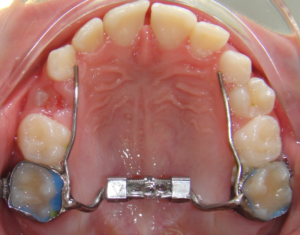
Food Restrictions
:max_bytes(150000):strip_icc()/Palateexpander-39523d5565ec467094ffaf4d2aac5002.jpeg)
Pain and Discomfort
Orthodontic expanders are commonly used in orthodontic treatment to widen the upper jaw and correct issues with bite alignment. While they are effective in achieving the desired results, they can also cause some discomfort and pain during the adjustment period.
One of the common problems associated with orthodontic expanders is the pain and discomfort that patients may experience. This is especially true in the first few days after the expander is placed in the mouth. The discomfort is usually described as a dull ache or pressure sensation, which can make it difficult for patients to eat or speak properly.
Causes of Pain and Discomfort
The pain and discomfort associated with orthodontic expanders can be attributed to several factors. Firstly, the expander itself puts pressure on the upper jaw, which is necessary to achieve the desired expansion. This pressure can cause soreness and discomfort in the jaw and surrounding areas.
Furthermore, the adjustment process itself can cause discomfort. Orthodontic expanders are typically adjusted by turning a key, which gradually widens the expander. This adjustment process can cause temporary soreness and pressure in the mouth.
Managing Pain and Discomfort
While some level of pain and discomfort is expected during the adjustment period, there are several ways to manage and alleviate these symptoms:
- Using a warm saltwater rinse can help soothe the irritated tissues and promote healing of mouth sores.
- Consuming soft foods and avoiding hard, crunchy, or sticky foods can help minimize discomfort while eating.
- Applying orthodontic wax to the expander can help reduce irritation and prevent mouth sores.
- Practicing good oral hygiene, including regular brushing and flossing, can help prevent infection and further discomfort.
Difficulty Speaking
Orthodontic expanders are commonly used to correct issues with the alignment of the teeth and jaw. While they can be effective in achieving the desired results, they can also present some challenges for patients, one of which is difficulty speaking.
When an orthodontic expander is first placed in the mouth, it can feel bulky and unfamiliar, which can make it difficult to speak clearly. The presence of the expander can affect the movement of the tongue and lips, causing speech impediments such as lisping or difficulty pronouncing certain sounds.
Practice
Patients can practice speaking with the expander in place to help train their tongue and lips to adapt to the new sensation. This can involve reading aloud, reciting tongue twisters, or engaging in conversations with friends or family members.
Speech Therapy
In some cases, patients may benefit from working with a speech therapist who can provide exercises and techniques to improve speech clarity while wearing an orthodontic expander. Speech therapy can be particularly helpful for individuals who have more severe speech difficulties.
Mouth Sores
Mouth sores are a common problem that can occur when wearing orthodontic expanders. These sores can be painful and uncomfortable, making it difficult to eat or speak properly. They can also lead to infections if not properly cared for.
Mouth sores can develop due to the constant rubbing of the expanders against the soft tissues of the mouth. The metal or plastic components of the expander can cause irritation and create small ulcers or blisters. These sores may appear on the cheeks, lips, tongue, or roof of the mouth.
If mouth sores do develop, there are several remedies that can help alleviate the discomfort. Rinsing the mouth with warm saltwater can help reduce inflammation and promote healing. Over-the-counter oral gels or ointments can also provide temporary relief by numbing the affected area.
Overall, while mouth sores can be an unpleasant side effect of wearing orthodontic expanders, they can be managed with proper care and attention. By practicing good oral hygiene and seeking professional help when needed, individuals can minimize the discomfort and ensure the success of their orthodontic treatment.
Excessive Saliva
One common problem that patients may experience with orthodontic expanders is excessive saliva production. This can be quite bothersome and may lead to embarrassment or discomfort.
The use of an orthodontic expander can stimulate the salivary glands, causing them to produce more saliva than usual. This can result in a constant flow of saliva in the mouth, which can be inconvenient and messy.
Excessive saliva can make it difficult to speak clearly and can also cause drooling, which can be embarrassing for some patients. It can also lead to the need for more frequent swallowing, which can be tiresome and uncomfortable.
To manage excessive saliva, patients can try the following tips:
- Swallow frequently to prevent drooling.
- Use a tissue or handkerchief to discreetly wipe away excess saliva.
- Avoid spicy or acidic foods that may further stimulate saliva production.
- Practice good oral hygiene to prevent any discomfort or irritation caused by excessive saliva.
- Stay hydrated to help regulate saliva production.
Overall, while excessive saliva production can be an annoying side effect of orthodontic expanders, it is usually temporary and manageable. By following these tips and seeking guidance from a dental professional, patients can minimize any discomfort or embarrassment associated with this problem.
Food Restrictions
When using orthodontic expanders, there are certain food restrictions that need to be followed in order to prevent damage to the device and ensure its effectiveness. These restrictions are important to keep in mind to avoid any complications during the treatment process.
Here are some common food restrictions that may be recommended when using orthodontic expanders:
- Hard and sticky foods: Hard and sticky foods such as hard candies, chewing gum, caramel, and taffy should be avoided. These types of foods can easily get stuck in the expander and may cause it to break or become loose.
- Crunchy foods: Crunchy foods like popcorn, nuts, and chips can also pose a risk to the expander. Biting into these foods can put excessive pressure on the device and lead to damage.
- Tough meats: Tough meats, such as steak or jerky, require a significant amount of chewing force. This force can be detrimental to the expander and may cause it to become loose or break.
- Hard fruits and vegetables: Fruits and vegetables that are hard, such as apples and carrots, should be cut into smaller, bite-sized pieces before consuming. Biting into these foods directly can put strain on the expander.
- Chewy or sticky candies: Chewy or sticky candies like gummy bears, caramels, and toffees should be avoided. These candies can easily get stuck in the expander and may be difficult to remove, leading to potential damage.
Loose or Broken Expander
Orthodontic expanders are dental devices that are used to widen the upper jaw to create more space for crowded teeth or to correct a crossbite. While these appliances are generally effective, there can be some common problems that patients may encounter.
Causes of a Loose or Broken Expander
A loose or broken expander can occur due to a variety of reasons. One common cause is improper care and maintenance. If the expander is not cleaned regularly or if it is not handled properly, it can become loose or break. Another cause can be excessive force applied to the expander, such as biting into hard or sticky foods.
Signs of a Loose or Broken Expander
There are several signs that may indicate a loose or broken expander. These include difficulty turning the expander, a change in the fit of the expander, or a clicking or popping sound when the expander is turned. In some cases, the expander may become completely loose or may break, causing discomfort or pain.
What to Do if Your Expander is Loose or Broken
Preventing a Loose or Broken Expander
Allergic Reactions
Allergic reactions are a potential problem that can occur with orthodontic expanders. These reactions can range from mild to severe and can manifest as redness, swelling, itching, or rash in the mouth or on the skin surrounding the mouth.
Orthodontic expanders are typically made from materials such as metal, plastic, or acrylic. While these materials are generally safe, some individuals may have allergies or sensitivities to them. Allergic reactions can occur when the body’s immune system mistakenly identifies these materials as harmful substances and triggers an immune response.
In some cases, individuals may develop an allergic reaction to an expander after it has been in place for some time. This can occur if the body’s immune system becomes sensitized to the material over time. If this happens, the orthodontist will need to evaluate the situation and determine the best course of action.
Speech Impediments
Orthodontic expanders can sometimes cause speech impediments, particularly during the initial adjustment period. This is because the expander device takes up space in the mouth and can affect the positioning of the tongue and other oral structures involved in speech production.
It is worth noting that not all individuals will experience speech impediments with orthodontic expanders. The extent and duration of any speech difficulties can vary depending on the individual and the specific type of expander used.
Pressure on Teeth
Orthodontic expanders are dental devices that are used to correct the alignment and spacing of teeth. They work by applying gentle pressure to the teeth and jaw, gradually widening the dental arch to create more space for crowded or misaligned teeth. While orthodontic expanders are effective in treating a variety of dental issues, they can sometimes cause discomfort and pressure on the teeth.
When an orthodontic expander is first placed in the mouth, it can take some time for the patient to adjust to the pressure. The pressure is necessary to achieve the desired results, but it can cause temporary discomfort. Patients may experience soreness or tenderness in the teeth and gums, especially during the initial days after the expander is activated.
Conclusion
Pressure on the teeth is a common issue that can occur when wearing an orthodontic expander. While the pressure is necessary for the device to work, it can cause temporary discomfort and soreness. By following the orthodontist’s instructions and taking steps to alleviate the pressure, patients can ensure that their treatment is effective and comfortable.
Headaches
Headaches are a common problem that can occur when using orthodontic expanders. The pressure exerted by the expanders on the teeth and jaw can sometimes cause discomfort and tension in the head, leading to headaches.
There are several reasons why headaches may occur during the use of orthodontic expanders:
- Tension in the jaw muscles: The expansion of the upper jaw can put strain on the muscles surrounding the jaw, leading to tension headaches.
- Misalignment of the jaw: Orthodontic expanders can sometimes cause temporary changes in the alignment of the jaw, which can result in headaches.
- Pressure on the sinuses: In some cases, the expansion of the upper jaw can put pressure on the sinuses, leading to sinus headaches.
In the meantime, there are a few things you can do to help relieve headaches caused by orthodontic expanders:
- Take over-the-counter pain relievers, such as ibuprofen, as directed by your orthodontist or healthcare provider.
- Apply a cold compress or ice pack to the affected area to help reduce inflammation and numb the pain.
- Practice relaxation techniques, such as deep breathing or meditation, to help alleviate tension in the jaw muscles.
- Avoid chewing hard or sticky foods that may exacerbate the headache.
Difficulty Sleeping
One common problem that patients may experience when using orthodontic expanders is difficulty sleeping. This can occur due to the discomfort and pressure caused by the expander device.
Orthodontic expanders work by applying gentle pressure on the upper jaw to gradually widen it. This can cause some discomfort, especially in the initial stages of treatment. The discomfort may make it difficult for patients to fall asleep or stay asleep throughout the night.
Additionally, the presence of the expander in the mouth can also cause irritation and soreness, further contributing to difficulty sleeping. The discomfort and soreness may be more pronounced during the first few days or weeks of wearing the expander.
Tips for Improving Sleep with Orthodontic Expanders
Here are some tips that may help patients improve their sleep while using orthodontic expanders:
- Using Pain Relief: Over-the-counter pain relievers can be used, as recommended by the orthodontist, to help manage any discomfort or soreness that may interfere with sleep.
- Practicing Good Oral Hygiene: Maintaining good oral hygiene by brushing and flossing regularly can help prevent irritation and mouth sores that may disrupt sleep.
- Using Orthodontic Wax: Applying orthodontic wax to the expander can help reduce irritation and soreness, making it easier to sleep.
By following these tips and communicating with the orthodontist, patients can improve their sleep quality while undergoing orthodontic treatment with expanders.
Proper Care and Maintenance
Proper care and maintenance of orthodontic expanders are essential to ensure their effectiveness and longevity. By following a few simple steps, you can keep your expander in good condition and minimize the risk of common problems.
2. Avoid certain foods: Some foods can damage or dislodge your expander. Avoid sticky or hard foods that can get stuck in the expander or put excessive pressure on it. Examples include chewing gum, caramel, nuts, and hard candies.
3. Be gentle when speaking: Speaking with an expander may take some practice. Be mindful of your speech patterns and try to speak slowly and enunciate clearly. This will help minimize any speech impediments caused by the expander.
4. Attend regular check-ups: Regular visits to your orthodontist are important to monitor the progress of your treatment and address any issues with the expander. Your orthodontist will make any necessary adjustments and ensure that the expander is functioning correctly.
5. Handle with care: Be careful when handling your expander to avoid bending or breaking it. Avoid pulling or twisting the expander, as this can damage its structure. If you notice any looseness or damage to the expander, contact your orthodontist immediately.
7. Maintain good oral hygiene: In addition to cleaning your expander, it is crucial to maintain good oral hygiene overall. Brush your teeth thoroughly twice a day, floss daily, and use mouthwash to keep your mouth clean and free from bacteria.
8. Be aware of allergic reactions: Some individuals may have allergies to certain materials used in orthodontic expanders. If you experience any signs of an allergic reaction, such as swelling, redness, or itching, contact your orthodontist immediately.
By following these care and maintenance tips, you can ensure that your orthodontic expander functions properly and helps you achieve the desired results. Remember to consult your orthodontist if you have any concerns or questions about your expander.

Dr. Fidel Cann: Esteemed orthodontist with a lifelong dedication to enhancing smiles and oral health. Pioneering expertise, compassionate care.
